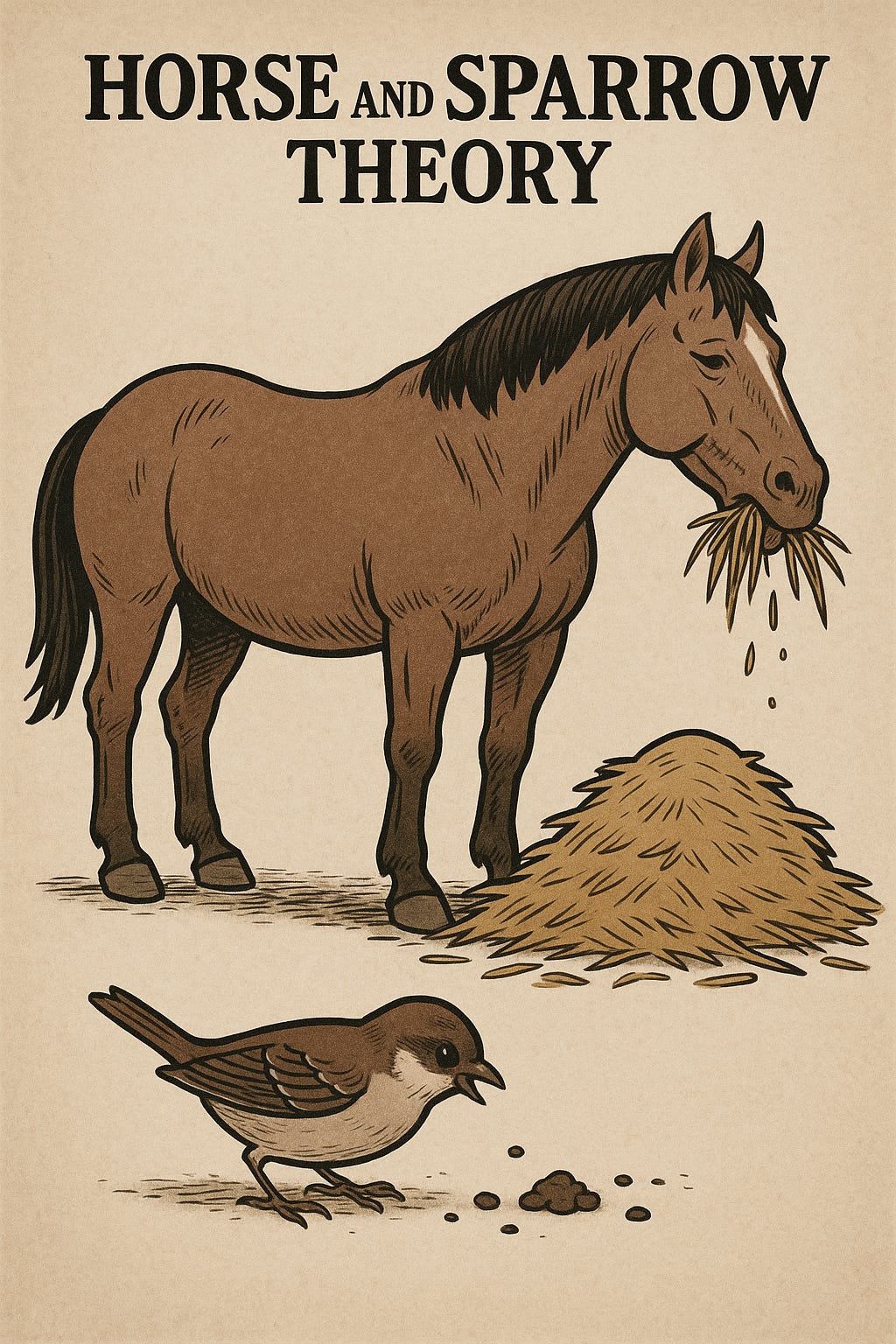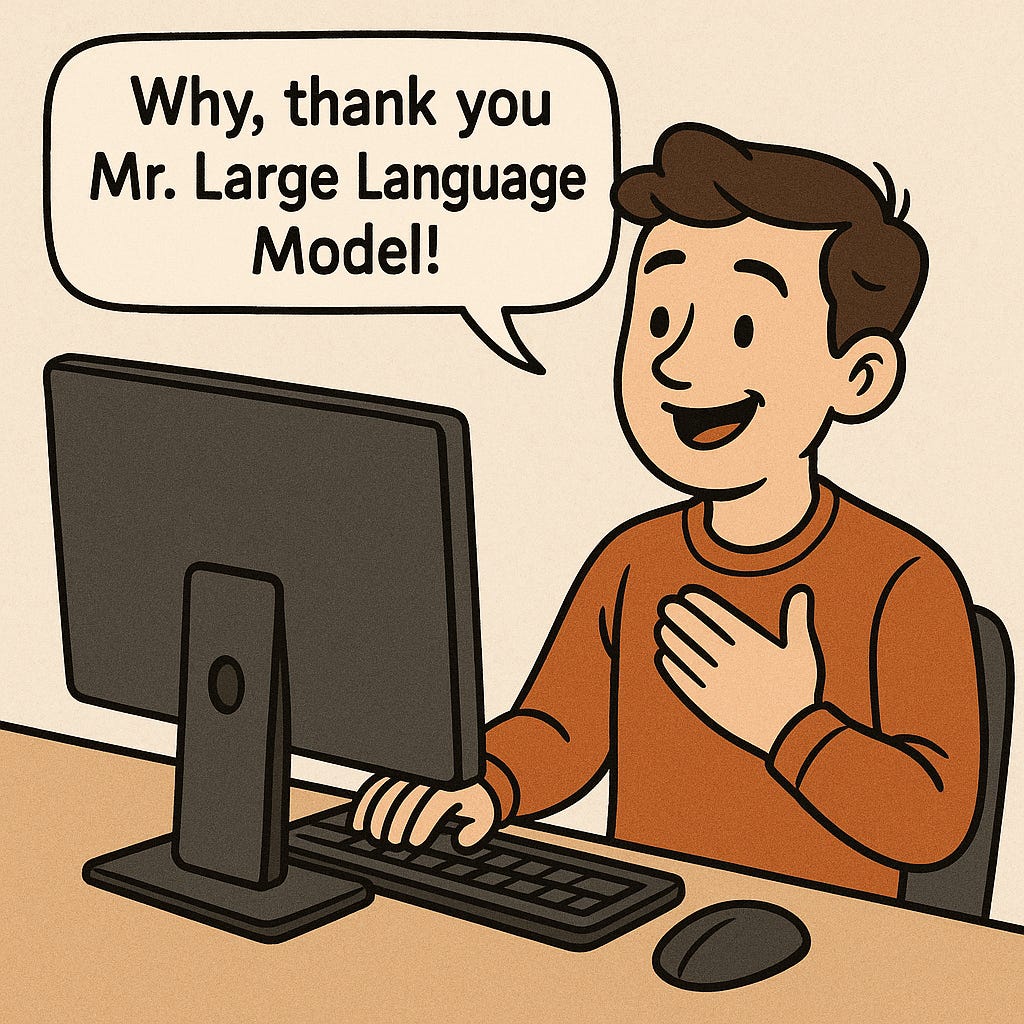Stop Thanking Your AI Agents
It seems like a common courtesy, but the downsides outweigh the benefits.
Last week a Sam Altman tweet declared that the politeness surrounding conversations with AI-based agents - simply saying “please” and “thank you” - were costing OpenAI tens of millions of dollars. This started up a debate about the cost-benefit analysis of the cost of being polite to a machine.
Some have fallen on the side of politeness - an interesting take given how shitty people have become to each other since Covid. In fact, before this debate occurred, this very newsletter had been privately touting the benefits of being polite to these machines. However, it’s time for an about-face and declare that not only do we not need to be polite to these models, we shouldn’t be polite to them.
The Cost Isn’t About the Dollars
The focus on Altman’s revelation is that OpenAI had spent tens of millions of dollars because of polite consumers using their nice words when interacting with their LLMs. But this newsletter truly could not care how much the dollar amount is that OpenAI - whose corporate structure of a starting as a non-profit and only shifting to for-profit when it’s clear the money would keep flowing should be illegal and whose corporate governance would make Enron blush - must pay for these types of interactions with their models.
The real cost that OpenAI (and the rest of us) should be focused on is environmental. It’s hard to understate how much energy these machines require to run at the level we’ve come to expect. The research so far has pointed to a massive increase in demand on a grid (particularly in the US) that is outdated and not ready for the increased load. The switch from climate-destroying fossil fuels was going to be difficult enough as it is, but the acute increase from models like those put out by OpenAI further complicates it.
One argument - that this newsletter finds entirely disingenuous - is that the gains made from AI-enabled workstreams (like solving climate change and our looming energy crisis) will far outweigh any short-term pain we have from more extreme weather events and rising seas. We all know how deferred gains from a venture meant to make a small few very wealthy with the promise of a windfall for everyone down the line actually works. There’s a reason the Reagan administration had to rebrand “trickle down economics” from its previously known moniker: “horse-and-sparrow theory.”
So while Sam Altman sees the “please” and “thank you” notes from users to the model as a polite L in his company’s P&L, the reality is they are much more damaging macroeconomically.
Human vs. Machine
But let’s pretend for a moment that there aren’t massive environmental impacts to how we conduct ourselves when it comes to these cool new AI toys we have access to. Let’s pretend the energy used to power these machines is clean (or, even better, also somehow reduced to reasonable levels.) There’s actually a larger problem with treating them politely.
And this is where those who have had the misfortune of hearing me talk about being polite to AI will be a little surprised, as one of my go-to jokes when people have watched me write prompts that contain “please” and “thank you” in the past is that I want a good human slave job when the machines take over. And while that line kills 80% of the time, I am publicly reversing my stance.
The reality is that AI and the machines that make it real for us humans are tools, and we need to treat them like that.
One argument brought up for the politeness (other than milquetoast humor that can be shared in a corporate setting) is that if we’re mean to the machines, we’ll be mean to each other. But here’s the thing: no one is asking you to be mean to a machine - the rule of the day should be neutrality. However, if you want to be mean to a machine and you can’t seem to turn it off when talking to humans, the problem isn’t that you’re being unkind to an AI model - it’s that you’re simply an asshole and AI isn’t going to help with that.
We don’t say please and thank you to inanimate objects, because they don’t understand the concept. While they remain entirely neutral to us, by anthropomorphizing the AI, we are losing sight of their utility and blurring the lines between what these things were created to be and what they are.

It may seem pedantic, but to maintain effectiveness of a tool you need to be able to see it without any kind of emotion attached to it. It’s true that emotion plays key - at times crucial - roles in our decision-making, mostly when it comes to values attached to larger decisions. But anthropomorphizing things that are supposed to be tools is not a winning strategy and can very well lead to severe blind spots.
Imagine a model you’ve become quite attached to gets objectively surpassed by a new one for the same use cases. The logical decision is to switch to the new one, but you find yourself coming up with small excuses as to why you remain with the old one. The cost of switching is too high (it isn’t.) Its efficacy isn’t 100% proven (it is.) Any kind of roadblock you can find, you use to justify your emotional attachment to the tool, even though your instincts tell you not to. It’s nearly taken down greater men.
If you’ve worked in the service industry long enough, you’ve seen incorrect decisions being made that simply have too much emotion attached to them. Is saying “please” and “thank you” to these faceless machines guaranteed to lead to that? Certainly not, but in a process that already has negative societal ramifications, we should avoid adding additional adverse variables.
Grab Bag Sections
WTF Room Service: There are few tangible benefits to work travel these days. Airline status becomes less valuable year over year and more and more difficult to attain. Traveling by train in America continues to be a national embarrassment. And Covid exacerbated the labor shortage that hotels were facing when it came to staffing their properties. One of the casualties of this? Room service.
Growing up, we were not even allowed to look at the mini bar, lest one of the snacks or refreshments suffer an immaculate opening and our family get charged $7.50 for three potato chips. So when I travel for work, the bright spot in that otherwise dull process was always the previously forbidden room service. There’s no better feeling than turning on a TBS Big Bang Theory rerun on the comically large and bright television with a plate of chicken fingers and french fries on a plate under a metal cover like it’s come straight from the kitchen of Per Se.
But now, room service is becoming less and less prevalent. Outside of the financial reasons (which, let’s be real, are the real reasons), the other excuse being given for this is the desire for higher quality and to “eat like a local.” That’s all well and good if you’re in a large city known for its cuisine, but for some road warriors they just want a plate of the finest fried food Sysco has on offer to eat on their hotel bed in their pyjamas. I don’t want to traipse through the lobby of a Munster, Indiana Homewood Suites in my jam-jams to pick up Uber Eats from a local diner because no one wants to commit to this business travel perk anymore. Bring back room service!
Album of the Week: Back in the mid-aughts, Houston rap was having a moment. Swishahouse had flooded metro Houston and Texas with an insane amount of talent in a short time and radio airplay couldn’t ignore the market for long. Chamillionaire, Paul Wall, Slim Thug - they all helped usher in the H-town sound to the rest of the country. And one of the catalysts was a rapper who is better known for his self-promotional gimmicks like giving out his cell phone number, but who also had rapping chops behind them: Mike Jones.
Because this is an album released in 2005, it has your typical rap tropes, some of which have not aged well. There’s the typical “I was huge underground now I’ve blown up and gone commercial aspect,” which is inoffensive to all but the most Marxist of hip hop heads. Then there’s the misogyny of “Women only want me thanks to my financial success” - essentially the entire basis of “Back Then” (which is, admittedly, a banger.) There’s also the theme that women are out to get Mike Jones and are not to be trusted - the premise of standout (and potentially best) track “Scandalous Hoes” - which showcases Jones’s rapping ability and is underpinned by a very smooth chorus from Lil Bran (if, of course, you can get past the distasteful subject.)
Those having trouble separating the art from the artist still have plenty to listen to. Breakout single “Still Tippin” (with a great feature from Slim Thug and Paul Wall’s first bars on a single) is excellent, and “Flossin” is quite good with another smooth chorus courtesy of Big Moe. Paul Wall really hit his stride as a feature on “What Ya Know About” and “5 Years From Now” is poignant for today’s time, which is wild considering it’s a 20-year-old song.
Take a trip down to the fourth largest city in the US and get chopped and screwed with Mike Jones’ debut album. Caddys on spokes optional, but encouraged.
Quote of the Week: “Once men turned their thinking over to machines in the hope that this would set them free. But that only permitted other men with machines to enslave them.” - Frank Herbet, Dune
See you next week!







